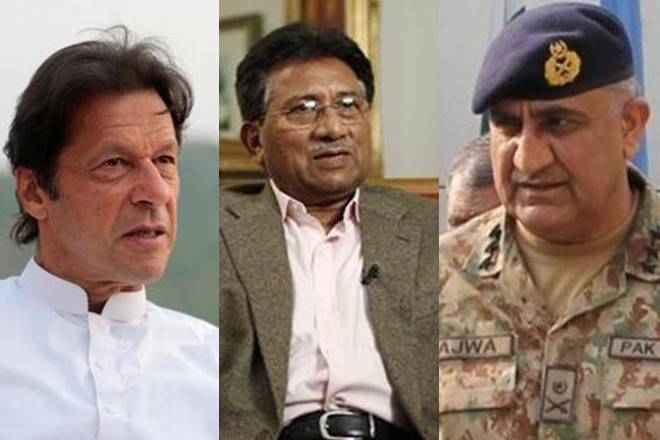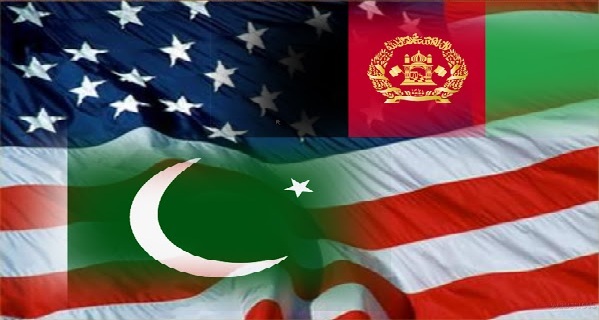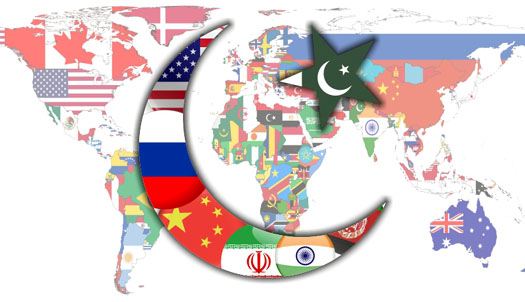
Senior Journalist Umer Farooq argues that Pakistan's participation in the war on terror, operations in tribal areas and nearly two decades of global focus on militancy impacted the country's foreign policy. The policymakers refashioned foreign policy as a product for domestic audiences. International support on Kashmir waned as it was seen as a terrorism problem and not a pending case of self-determination.
Two events in 2004 proved to be the starting point of radical transformation of how Pakistani Foreign Policy Establishment tackled policy challenges faced by the country. This was also the starting point of a shift in how foreign policy challenges were presented within the country mainly to appease domestic audiences.
First, in January 2004, country’s military ruler General Musharraf—in a joint statement after a summit meeting-- reassured the then Indian Prime Minister Vajpayee that “he will not permit any territory under Pakistan's control to be used to support terrorism in any manner”. Secondly in March 2004, with the encouragement of the Washington, 80,000 Pakistani troops entered the Federally Administered Tribal Area to search for al-Qaeda operatives who had fled Afghanistan after US invasion.
 Both these events pushed the traditional foreign policy issues, like Kashmir and relations with India into the background. Now the members of Pakistani foreign policy establishment—both military and civil—started to be confronted with only one type of questions in their meetings with foreign dignitaries. Whether they were visiting foreign capitals or were meeting foreign dignitaries who were visiting Islamabad the issues discussed remained related to the internal security situation faced by the country.
Both these events pushed the traditional foreign policy issues, like Kashmir and relations with India into the background. Now the members of Pakistani foreign policy establishment—both military and civil—started to be confronted with only one type of questions in their meetings with foreign dignitaries. Whether they were visiting foreign capitals or were meeting foreign dignitaries who were visiting Islamabad the issues discussed remained related to the internal security situation faced by the country.
In Vajpayee-Musharraf joint statement of January 2004, the then military government implicitly acknowledged that Pakistani state was facing terror groups, which could be involved in carrying out terror strikes across the border in neighboring countries. Within three months of this statement in March 2004, Pakistani military started the most well organized and most well funded military operation since 1971 East Pakistan military operation, against a terror group based in Pakistani tribal areas.
https://twitter.com/nayadaurpk_urdu/status/1162682809263296512?s=20
The terror groups’ response was a bit late in coming as they started a wave of suicide bombings in July 2007, which continued till December 2010. This led Pakistani army to launch simultaneous military operations against militant and terror groups in all the tribal agencies bordering Afghanistan.
One of the little noticed impact of all this was that Pakistani foreign policy establishment moved away from the traditional foreign policy issues that it used to project at the international stage. The world was now little interested in Kashmir conflict or the noble cause of pushing Pakistan and India into some kind of peace process for normalization of relations.
In the initial months after 2004 the visiting US diplomats used to publicly talk about Pakistani militant groups and their forays into Indian held Kashmir (IHK). For instance, US officials used to publicly talk about the commitment they had received from military rulers of Pakistan not to allow the terror and militant groups to cross the line of Control into Kashmir.
There were few highly patriotic journalists who used to pose questions about Kashmir—whether visiting dignitaries’ country supported UN Resolution on Kashmir or not—to every foreign diplomat visiting Islamabad. But then these types of question started to get replaced by whether Pakistani military’s operations in tribal areas are contributing in the international war against terror.

I remember interviewing a senior official of Pakistani foreign office in those days. He talked about the changing world Pakistani foreign office was facing after Pakistan started military operations in tribal areas, “It seems now nobody is interested any more in Kashmir issue, or Pakistani efforts to normalize relations with India or all other conventional foreign policy issues Pakistani foreign office was interested in” he told me then.
In the years following US invasion of Afghanistan and commencement of international war against terror, Pakistani diplomacy was part of larger US diplomatic effort to convince the world capitals that terror emanating from international terror groups like Al-Qaida posed a grave threat to global security and that Pakistani military’s sacrifices in this war effort demands international support. This resulted in numbers of heads of state and foreign ministers visiting Islamabad to support Pakistani military. Similarly this also led to an avalanche of supporting speeches and statements emanating from world capital praising Pakistani military leaders.
Subsequently, the Kashmir issue moved into the background. Even if there was any mention of the Kashmir dispute it was with regard to Pakistani based militant groups, which, according to most of the countries of international community, were involved in terror strikes against Indian state in Kashmir. Not surprisingly all the three main Pakistan based militant groups operating in India Held Kashmir—Lashkar-e-Taiba, Harkat-ul-Mujahideen and Jasiah-e-Muhammad—had direct or indirect links with Al-Qaida. As a result Kashmir issue started to be discussed in the context of international terrorism and not as an issue of self-determination of oppressed people of Kashmir.
Pakistani state was too busy enjoying the praise it received, in the initial years, as the military struggled to confront the militants and their supporting networks in Pakistani tribal areas. They didn’t realize how it was impacting the Kashmir cause.
https://www.youtube.com/watch?v=jQw1b7ovIX8&t=18s
At the same time Pakistani state was facing a fractured society, which was divided down the middle into opposing camps on the question of supporting or opposing Pakistan’s military effort as part of American led war against terror.
Two contradictory trends were overcoming Pakistani state’s comprehension of Foreign policy challenges faced by the country in the wake of these developments. First, as traditional foreign policy issues were pushed into the background, Pakistan’s foreign policy establishment reach and impact in international capitals was drastically reduced. Around the same time Pakistan state launched a massive propaganda campaign to convince the local populace that the state institutions were not only fighting the enemy of the state and society domestically, they were in fact serving the best national interests at the international stage.
All of this resulted in Pakistani foreign policy establishment framing the foreign policy issues for domestic audiences. First of all it became a necessity because the state institutions realized that the successful military operations against the militants required the strong support of the local public opinion. Secondly, military operations against the militant groups became the biggest foreign policy issue, which, was the key issue foreign dignitaries were interested in discussing with Pakistani officials. In such a situation, the domestic public opinion assumed the importance in Pakistani foreign policy it never had in the history of the country.
There is little chance that Kashmir issue will regain the importance it once had in Pakistani foreign policy. Firstly there is a lukewarm response in Pakistani society to happenings in Kashmir, apart from the state sponsored activities. Secondly, international community is still turning deaf ears to Kashmir cause.
https://www.youtube.com/watch?v=VEBrySoL96Q&t=30s
Umer Farooq is an Islamabad-based freelance journalist. He writes on security, foreign policy and domestic political issues.
Two events in 2004 proved to be the starting point of radical transformation of how Pakistani Foreign Policy Establishment tackled policy challenges faced by the country. This was also the starting point of a shift in how foreign policy challenges were presented within the country mainly to appease domestic audiences.
First, in January 2004, country’s military ruler General Musharraf—in a joint statement after a summit meeting-- reassured the then Indian Prime Minister Vajpayee that “he will not permit any territory under Pakistan's control to be used to support terrorism in any manner”. Secondly in March 2004, with the encouragement of the Washington, 80,000 Pakistani troops entered the Federally Administered Tribal Area to search for al-Qaeda operatives who had fled Afghanistan after US invasion.
 Both these events pushed the traditional foreign policy issues, like Kashmir and relations with India into the background. Now the members of Pakistani foreign policy establishment—both military and civil—started to be confronted with only one type of questions in their meetings with foreign dignitaries. Whether they were visiting foreign capitals or were meeting foreign dignitaries who were visiting Islamabad the issues discussed remained related to the internal security situation faced by the country.
Both these events pushed the traditional foreign policy issues, like Kashmir and relations with India into the background. Now the members of Pakistani foreign policy establishment—both military and civil—started to be confronted with only one type of questions in their meetings with foreign dignitaries. Whether they were visiting foreign capitals or were meeting foreign dignitaries who were visiting Islamabad the issues discussed remained related to the internal security situation faced by the country.In Vajpayee-Musharraf joint statement of January 2004, the then military government implicitly acknowledged that Pakistani state was facing terror groups, which could be involved in carrying out terror strikes across the border in neighboring countries. Within three months of this statement in March 2004, Pakistani military started the most well organized and most well funded military operation since 1971 East Pakistan military operation, against a terror group based in Pakistani tribal areas.
https://twitter.com/nayadaurpk_urdu/status/1162682809263296512?s=20
The terror groups’ response was a bit late in coming as they started a wave of suicide bombings in July 2007, which continued till December 2010. This led Pakistani army to launch simultaneous military operations against militant and terror groups in all the tribal agencies bordering Afghanistan.
One of the little noticed impact of all this was that Pakistani foreign policy establishment moved away from the traditional foreign policy issues that it used to project at the international stage. The world was now little interested in Kashmir conflict or the noble cause of pushing Pakistan and India into some kind of peace process for normalization of relations.
In the initial months after 2004 the visiting US diplomats used to publicly talk about Pakistani militant groups and their forays into Indian held Kashmir (IHK). For instance, US officials used to publicly talk about the commitment they had received from military rulers of Pakistan not to allow the terror and militant groups to cross the line of Control into Kashmir.
There were few highly patriotic journalists who used to pose questions about Kashmir—whether visiting dignitaries’ country supported UN Resolution on Kashmir or not—to every foreign diplomat visiting Islamabad. But then these types of question started to get replaced by whether Pakistani military’s operations in tribal areas are contributing in the international war against terror.

I remember interviewing a senior official of Pakistani foreign office in those days. He talked about the changing world Pakistani foreign office was facing after Pakistan started military operations in tribal areas, “It seems now nobody is interested any more in Kashmir issue, or Pakistani efforts to normalize relations with India or all other conventional foreign policy issues Pakistani foreign office was interested in” he told me then.
In the years following US invasion of Afghanistan and commencement of international war against terror, Pakistani diplomacy was part of larger US diplomatic effort to convince the world capitals that terror emanating from international terror groups like Al-Qaida posed a grave threat to global security and that Pakistani military’s sacrifices in this war effort demands international support. This resulted in numbers of heads of state and foreign ministers visiting Islamabad to support Pakistani military. Similarly this also led to an avalanche of supporting speeches and statements emanating from world capital praising Pakistani military leaders.
Subsequently, the Kashmir issue moved into the background. Even if there was any mention of the Kashmir dispute it was with regard to Pakistani based militant groups, which, according to most of the countries of international community, were involved in terror strikes against Indian state in Kashmir. Not surprisingly all the three main Pakistan based militant groups operating in India Held Kashmir—Lashkar-e-Taiba, Harkat-ul-Mujahideen and Jasiah-e-Muhammad—had direct or indirect links with Al-Qaida. As a result Kashmir issue started to be discussed in the context of international terrorism and not as an issue of self-determination of oppressed people of Kashmir.
Pakistani state was too busy enjoying the praise it received, in the initial years, as the military struggled to confront the militants and their supporting networks in Pakistani tribal areas. They didn’t realize how it was impacting the Kashmir cause.
https://www.youtube.com/watch?v=jQw1b7ovIX8&t=18s
At the same time Pakistani state was facing a fractured society, which was divided down the middle into opposing camps on the question of supporting or opposing Pakistan’s military effort as part of American led war against terror.
Two contradictory trends were overcoming Pakistani state’s comprehension of Foreign policy challenges faced by the country in the wake of these developments. First, as traditional foreign policy issues were pushed into the background, Pakistan’s foreign policy establishment reach and impact in international capitals was drastically reduced. Around the same time Pakistan state launched a massive propaganda campaign to convince the local populace that the state institutions were not only fighting the enemy of the state and society domestically, they were in fact serving the best national interests at the international stage.
All of this resulted in Pakistani foreign policy establishment framing the foreign policy issues for domestic audiences. First of all it became a necessity because the state institutions realized that the successful military operations against the militants required the strong support of the local public opinion. Secondly, military operations against the militant groups became the biggest foreign policy issue, which, was the key issue foreign dignitaries were interested in discussing with Pakistani officials. In such a situation, the domestic public opinion assumed the importance in Pakistani foreign policy it never had in the history of the country.
There is little chance that Kashmir issue will regain the importance it once had in Pakistani foreign policy. Firstly there is a lukewarm response in Pakistani society to happenings in Kashmir, apart from the state sponsored activities. Secondly, international community is still turning deaf ears to Kashmir cause.
https://www.youtube.com/watch?v=VEBrySoL96Q&t=30s
Umer Farooq is an Islamabad-based freelance journalist. He writes on security, foreign policy and domestic political issues.
